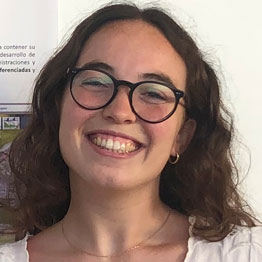11/02/2025
Published in
Diario de Navarra
Lide de Izeta Zalduendo :: Lide de Izeta Zalduendo
Researcher at the BIOMA Institute and doctoral candidate at the School of Sciences of the University of Navarra.
 When I was approached to write an article describing my experience as a young scientist in the framework the International Day of Women and Girls in Science The first thing that came to my mind was "Me? But I don't have anything interesting to say about it". I have been fortunate that being a woman has never stopped me from pursuing my goals. At the age of 18 I decided to study Biology when I realized that Medicine was not my thing. Although a bit of a rebound, I ended up liking the degree program so much that when I finished it I couldn't decide on an area to focus on. I then focused on data analysis, through a Master's Degree in Computational Methods in Science, because it allowed me to analyze both environmental and clinical data . I was hired from the BIOMA Institute of the University of Navarra as a technician in a research project and that led to the completion of a doctoral thesis , which is what I am currently working on. However, despite having overcome these stages, I often meeting myself questioning my ability as a researcher, feeling that I am in a position that does not correspond to me, that I do not deserve. This does not only happen to me, it is a recurring topic of conversation with other colleagues, especially young scientists, and a short search indicates that it is a fairly widespread phenomenon, so I decided to dedicate this article to it.
When I was approached to write an article describing my experience as a young scientist in the framework the International Day of Women and Girls in Science The first thing that came to my mind was "Me? But I don't have anything interesting to say about it". I have been fortunate that being a woman has never stopped me from pursuing my goals. At the age of 18 I decided to study Biology when I realized that Medicine was not my thing. Although a bit of a rebound, I ended up liking the degree program so much that when I finished it I couldn't decide on an area to focus on. I then focused on data analysis, through a Master's Degree in Computational Methods in Science, because it allowed me to analyze both environmental and clinical data . I was hired from the BIOMA Institute of the University of Navarra as a technician in a research project and that led to the completion of a doctoral thesis , which is what I am currently working on. However, despite having overcome these stages, I often meeting myself questioning my ability as a researcher, feeling that I am in a position that does not correspond to me, that I do not deserve. This does not only happen to me, it is a recurring topic of conversation with other colleagues, especially young scientists, and a short search indicates that it is a fairly widespread phenomenon, so I decided to dedicate this article to it.
I have often heard colleagues express these subject of concerns: admitting that they have doubts about the quality of their work (whether it is "good" enough), fearing that they are not up to the task, or attributing their success to external circumstances, such as luck or overexertion, rather than to their own skill All this despite having objective evidence of their aptitude, as well as the recognition of their colleagues.
In its maximum expression, this phenomenon has a name: the Imposter Syndrome, described for the first time in women in an article published in 1978: "The imposter phenomenon in high achieving women: Dynamics and therapeutic intervention", by Dr. Pauline R. Clance and Dr. Suzanne A. Imes. These women, although it has been seen in recent years that men also suffer from it, firmly believe that any achievement or success achieved throughout their lives is the result of a mistake or a stroke of luck and not due to their skill or intelligence. These feelings of inadequacy, often in the professional sphere, cause the person to feel like an impostor, fearing that at any moment they will be discovered as a fraud. In addition to the anguish this entails, it can push the person to work to exhaustion to maintain the "illusion" of skill or to pass up opportunities for fear of not measuring up.
The world of Science, especially the academic world, is a good breeding ground for the development of these thoughts and insecurities because it is competitive and very specialized, with highly trained people, which makes it very easy to compare oneself with others. I am not going to go into the reasons why they develop, mainly because there are many and varied reasons. However, I did want to make them visible on a day like today, since simply knowing that they exist can be a relief and a way to put them in perspective. How to get rid of them? One of Clance and Imes' proposals in the 1978 article is to discuss it with other colleagues. Discovering that other professionals, who we know to be competent, experience the same doubts that one does, financial aid to rationalize them and discard them.
Women have had a hard time making their way in the world of science. Today we are increasingly present in this and other areas. To have reached this point is a reason to thank the women scientists who paved the way, to celebrate and to hope, although there is still a long way to go towards equity. Now that we are here, we have to believe it, believe that we are worthwhile, that we contribute new ideas and that we enrich science.
